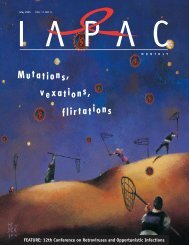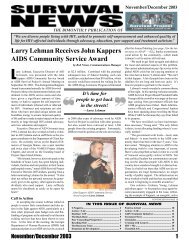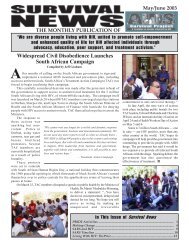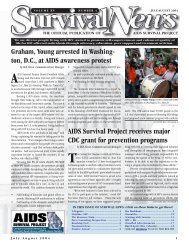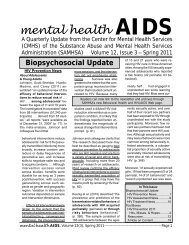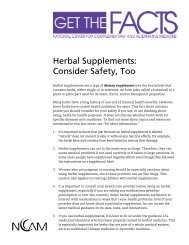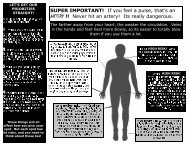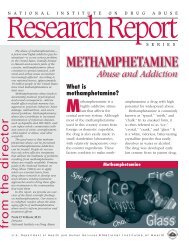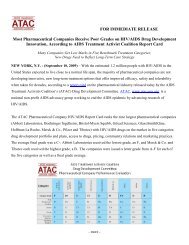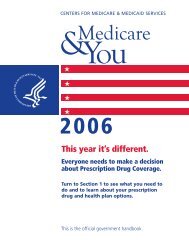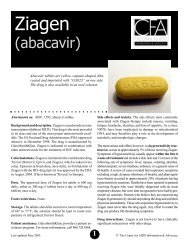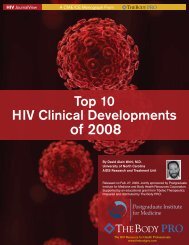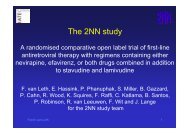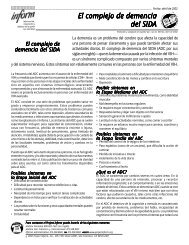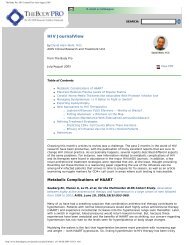WELLNESS STARTS WITH AWARENESS - CD8 T cells - The Body
WELLNESS STARTS WITH AWARENESS - CD8 T cells - The Body
WELLNESS STARTS WITH AWARENESS - CD8 T cells - The Body
You also want an ePaper? Increase the reach of your titles
YUMPU automatically turns print PDFs into web optimized ePapers that Google loves.
was still crying soft ly. He opened the door a crack and I handed<br />
him the clothing. “I used to be somebody, Jeff ,” he whispered. “I<br />
used to be somebody.”<br />
Ken 1998<br />
A 42-year-old transplant to Chicago from New York City since<br />
1998, Ken described his time in New York as<br />
the best years of his life. He remembered an<br />
active social life, involvement in a 12-step<br />
recovery program for substance use, and a<br />
career as an emergency room nurse. Diagnosed<br />
with HIV in 1991, his health deteriorated<br />
rapidly with one opportunistic infection<br />
aft er another. He came to Chicago to<br />
make a fresh start, but quickly relapsed on<br />
multiple substances and processes (alcohol,<br />
narcotics, and sex). He came to see me initially<br />
because his nursing license had been suspended for writing<br />
false prescriptions to maintain his habit and he was mandated to<br />
see a therapist, among other activities, in order to lift the suspension.<br />
Ken had a small apartment on the north side of the city that he<br />
managed to keep due to a small inheritance from his parents. He<br />
was unable to work in nursing, however, because of his suspended<br />
license. His health also compromised his ability to maintain other<br />
steady employment. He subsidized his income with short-term<br />
temporary administrative jobs, many of which paid him in cash.<br />
“What’s the point anymore, Jeff ? None of my friends live in Chicago,<br />
and most of my friends from New York are dead. I don’t have<br />
any energy left ,” he shared with me in March of 2000, aft er being<br />
discharged from the hospital because of a bout with pneumonia.<br />
Mark 1996<br />
“I had to give my dog away,” Mark shared with me in our fi rst<br />
meeting in 1996. “I can’t even take care of her, let alone myself.” He<br />
stared at the fl oor and bounced his leg up and down as he waited for<br />
my response—and for the judgment he feared I would share with<br />
him. I quietly invited him to tell me more.<br />
Mark had left a successful position in real estate voluntarily.<br />
He was 45 years old at the time and had saved enough money to<br />
be unemployed for a short while as he explored alternative professions.<br />
Originally from a small town in Iowa, Mark had come to<br />
Chicago as a teenager who realized that he could not safely be gay<br />
in small town Iowa. He worked to put himself through college and<br />
was active in Chicago’s gay social scene of the 1970s. “Th at was an<br />
incredible time in my life,” Mark shared. “But it also resulted in<br />
alcoholism and HIV.”<br />
During the fi rst year of our work together, Mark exhausted the<br />
money he had saved and began doing temporary day labor as jobs<br />
arose. Eventually, his health deteriorated to the point of not being<br />
able to work at all and he applied for and began receiving disability<br />
payments. His body changed as a result of both HIV and the<br />
medications he was taking. Th e pride he once felt from his physical<br />
fi tness shift ed to shame as he described his weight gain, sunken<br />
cheeks, and areas of lipodystrophy.<br />
In 1999, I remember a session where I asked Mark to imagine<br />
what he would like his life to be like—to close his eyes and think<br />
PA • September / October 2008 • tpan.com • positivelyaware.com<br />
Positively Aware<br />
about where he would live, the kind of job he would have, and what<br />
his social life would be like. “I can’t do that because it’s not possible<br />
anymore,” he said with resignation. With gentle prompting,<br />
he eventually shared: “I would live in a high-rise in Lincoln Park<br />
with views of the lake. I’d be working in real estate again and I’d<br />
feel hopeful. But I don’t think that’s going to happen, Jeff . It’s too<br />
late now.”<br />
Today, Joey is working<br />
as an attorney again.<br />
Joey, Ken, and Mark 2008<br />
Joey, Ken, and Mark did not believe they would be alive in<br />
2008. Or, if they were still alive, they thought their quality of life<br />
would be severely compromised. Th ey had resigned themselves to<br />
illness and our initial work together was more about acceptance<br />
than it was about hope, wellness, and the future.<br />
Today, Joey is working as an attorney again. He owns his own<br />
home on Chicago’s South Side. He has a small circle of close friends,<br />
and has connected with a large extended family with whom he<br />
spends a great deal of time. He walks and exercises regularly. He<br />
plays tennis occasionally. He loves music. He laughs a great deal.<br />
His health is still a concern, but when a health issue arises, he is<br />
quick to address it.<br />
Today, the suspension on Ken’s nursing license has been lift ed<br />
and he is once again working as an ER nurse. He has a renewed relationship<br />
with his sister and has forged a close relationship with a<br />
cousin whom he visits several times per year. He has also acquired a<br />
cat who he says greets him with anticipation upon his arrival home<br />
from work each day. He continues to have health problems, many<br />
of which are not a direct result of the HIV. And, he still hopes to<br />
increase his circle of friends in Chicago. Still, he says he is grateful<br />
for what he has and for how far he has come.<br />
Today, Mark lives on Lake Shore Drive in a high-rise facing<br />
Lake Michigan. He works full time in real estate and recently was<br />
promoted to manage an offi ce on the north side of Chicago. He has<br />
been sober for over 20 years and has a strong connection to the<br />
recovery community. In addition to having his own sponsor, he has<br />
three individuals whom he sponsors. He exercises three times per<br />
week and has lost 20 pounds. Mark has also invested considerable<br />
energy in his emotional and spiritual growth, attending a number<br />
of weekend workshops and retreats. He remains dissatisfi ed with<br />
the eff ects medications have had on his body (in combination with<br />
the eff ects of aging), but says he fi nds himself feeling hopeful more<br />
oft en than not.<br />
Joey, Ken, and Mark, however, are not alone in this journey.<br />
Many men, women, and children diagnosed with HIV 10, 15, or 20<br />
years ago were not expected to live long, let alone live with hopefulness<br />
and an attention to wellness. Certainly advances in medication<br />
and other interventions have played a major role in living “well”<br />
with HIV. Th ere are other critical ingredients—listed below—to<br />
41



